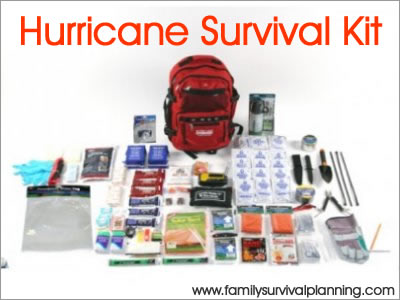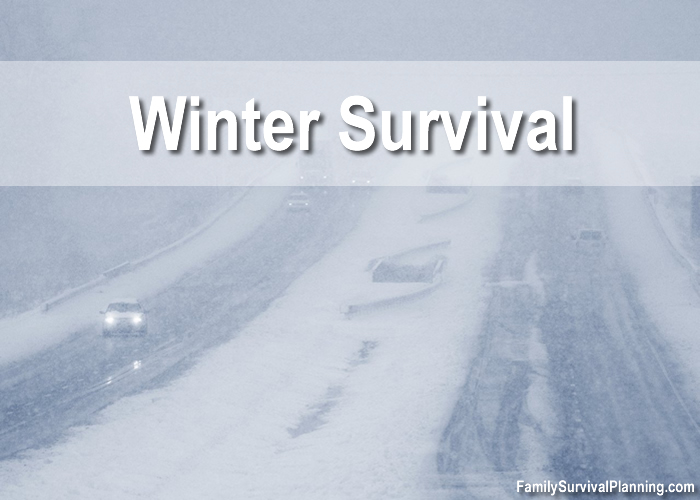- HOME
- Natural Disaster Survival
- Hurricane Preparedness
Hurricane Preparation:
Before, During and After

Learning how to prepare for a hurricane is critical if you live near a coast where tropical storms form, such as the Atlantic and Gulf of Mexico areas.
Not only are the winds terrific, there most likely will be flooding — sometimes far inland. It happened with Hurricane Sandy on the New Jersey coast and in 2017 with Harvey, Irma, and Maria. (Whew! What a year!)
Even though a hurricane can be fairly accurately predicted (at least that it IS coming), many people are not prepared — at all. Many are not as prepared as they think they are.
Invest in emergency food storage now and enjoy peace of mind for the next 25 years. Don't miss out on the savings!
What lessons can we learn from recent hurricanes?
Most of my usual readers are aware that these statements are true (or you wouldn't be reading here).
- A minority of people were pretty well prepared for whatever disaster may come.
- A slightly larger number of people were somewhat prepared but not if the emergency persists for a while.
- The majority of people were totally unprepared for any crisis outside of their normal routine of living.
Look around you. How many of your friends and family fit into the first category? Yeah, mine too — the majority do not.
Those "common sense" people (aka preppers) are prepared to weather a hurricane because they have stocked up on food, water, shelter, emergency essentials, and a means to defend themselves. They may look at self-reliance as only a minor discomfort or inconvenience. They do not require supplies or help from government.
These people are in the minority.
The Usual Hurricane Scenario
The majority, even though they are warned ahead of time about fiercely high winds and possible extensive flooding, usually assume there will only be a lot of rain and some standing water on the roads. As the water begins to wash out roads and curfews are enforced:
- The unprepared rush to grocery and convenience stores to buy water, only to find the supplies gone or that they are trapped by blocked roads. Here they are surrounded by water and not a drop of it drinkable!
- Gas pumps are either not working or there are long lines as people crowd to the gas stations because they didn't keep their tanks (at least!) half full.
- Credit and debit systems quit working = no money to buy anything.
- Roads are washed out or blocked = no escape for many.
- The "freeway refugees", those that decided to try and escape, find the highway to be a parking lot. They are stuck there, or in small towns off the highway, until the storm passes with no water, no food, no cash, no supplies of any kind.
Think for a moment about how quickly this scenario can happen.
For instance: Puerto Rico, an already bankrupt country where most everything is imported, is hit with not one, but two hurricanes in a row. Unless a person was already well-prepared, there was not much chance of them stocking up as the hurricanes made landfall. Now, there’s little way for them to recover, not for weeks, or months, and most likely, years.
If you take no other lesson from 2017, the year of 3 hurricanes, wildfires all over the Western U.S., and earthquakes in Idaho (140 cluster earthquakes) and Mexico (2), consider how fast things can happen and stop procrastinating. Get prepared!

What to do before the hurricane comes

- Prepare to survive on your own for at least three days. Assemble a 72-hour kit, including food and drinking water. Choose food that needs no preparation such as freeze dried pouches, energy or granola bars, small cans of food with pop tops. Water in a disaster kit is essential — bottles or pouches — as the water all around you will most assuredly be contaminated. Items like water purification tablets or drops, or a personal water filter or water filtration bottle will fit easily into your backpack.
- Guns and ammunition. Let's admit it — we have all seen the looting and crime that comes in emergencies. Sad but true. Prepare for this.
- Flashlights, batteries, headlamps, candles, and lighters. Most likely there will be no electricity. Have several flashlights or other lighting methods and plenty of batteries — they don't last long when used a lot.
- Purchase a Weather Radio with battery backup. Listen for local radio or television weather forecasts.
- Have a way to cook food. Without electricity, explore ways to cook food in case you need to cook frozen foods that might spoil — propane, wood fire, charcoal using a cast iron Dutch oven.
- Rain gear. Waders, water proof boots, ponchos, rain jackets, tarps, heavy duty plastic bags, water proof plastic containers — anything that puts you outside is going to be wet. Depending on the flood levels, you may need waders or even a boat or canoe.
- Learn evacuation routes. Ask your local emergency management office about community evacuation plans relating to your neighborhood. Determine where you would go and how you would get there.
- Fuel – If you know a flood is coming, fill up your gas tanks and your gas cans beforehand. After the storm is always too late.
- Create a household disaster plan. Talk to your family about hurricane preparation issues, including where to meet in emergencies.
- Make plans to secure your property such as permanent storm shutters for windows. Boarding up windows is also an option. Have them pre-cut and ready to install.
- Learn how to shut off utilities and where gas and water shutoffs are located. Do not shut off the gas for practice - only the gas company can turn it back on.
- Install straps or additional clips to securely fasten your roof to the frame structure. This may substantially reduce roof damage.
- Clear dead limbs or trees that could cause personal injury or property damage. Clean rain gutters and downspouts.
- If you own a boat, make sure it is secured.
- Purchase flood insurance if it is available in your area. Purchase it well in advance as there is a 30-day waiting period before it takes effect.
- Make a record or copy of your personal property and important papers.Take photographs or videotapes of the exterior and interior of your home, including personal belongings. Make copies of important documents. Store these in a safe place, such as a safe deposit box and/or your emergency preparedness kit planner.
What to do during a hurricane threat
1. Listen to radio or television newscasts. If a hurricane watch is issued, you typically have 24-36 hours before the hurricane hits land.
2. Make sure all family members know where to meet.
3. Secure your home according to the items above that you have prepared.
4. Gather several days' supply of food and water for every family member. Since water systems may become contaminated or damaged, sterilize the bathtub and other containers with a diluted bleach solution (1 part bleach to 10 parts water) and fill them with clean water in case you are unable to or told not to evacuate.
5. If you are evacuating, take your disaster supplies kit with you to the shelter.Remember that alcoholic beverages and weapons are prohibited within public shelters. Pets are not allowed in public shelters due to health reasons, so make sure your pets are safe somewhere.
6. Prepare to evacuate.
7. Evacuate to an inland location if:
- Local authorities announce an evacuation and you live in an evacuation zone.
- You live in a mobile home or temporary structure - they are particularly hazardous during hurricanes, no matter how well fastened to the ground.
- You live in a high-rise. Hurricane winds are stronger at higher elevations.
- You live on the coast, on a floodplain, or near a river or inland waterway.
- You feel you are in danger.
8. When authorities order an evacuation:
- Leave immediately.
- Follow evacuation routes announced by local officials.
- Stay away from coastal areas, riverbanks, and streams.
- Tell others where you are going.
9. If you are not required or are unable to evacuate, stay indoors during the hurricane and away from windows and glass doors. Keep curtains and blinds closed. Do not be fooled if there is a lull; it could be the eye of the storm - the winds will pick up again.
- If not instructed to turn it off, turn the refrigerator to its coldest setting and keep it closed.
- Turn off propane tanks.
10. In strong winds, follow these hurricane preparation rules:
- Take refuge in a small interior room, closet, or hallway.
- Close all interior doors. Secure and brace external doors.
- In a two-story residence, go to an interior first-floor room, such as a bathroom or closet.
- In a multi-story building, go to the first or second floors and stay in interior rooms away from windows.
- Lie on the floor under a table or other sturdy object.
11. Avoid using the phone except for serious emergencies. Local authorities need first priority on telephone lines.

What to do after a hurricane
1. Stay where you are if you are in a safe location until local authorities say it is safe to leave.
2. Stay tuned to local radio or television stations for information about caring for your household, where to find medical help, how to apply for financial assistance, and so on.
3. Drive only when necessary. Streets will be filled with debris. Roads will have weakened and could collapse. Do not drive on flooded or barricaded roads or bridges. Roads are closed for your protection. As little as 6 inches of water may cause you to lose control if your vehicle - 2 feet of water will carry most cars away.
4. Do not drink or prepare food with tap water until notified by officials that it is safe to do so.
5. Consider your family's health and safety needs. Be aware of symptoms of stress and fatigue. Keep your household together and seek crisis counseling if you have need.
6. Talk with your children about what has happened and how they can help during the recovery. Being involved will help them deal with the situation. Consider the needs of your neighbors. People often become isolated during hurricanes.
7. Stay away from disaster areas unless local authorities request volunteers. If you are needed, bring your own drinking water, food, and sleeping gear.
8. Stay away from riverbanks and streams until potential flooding has passed.Do not allow children to play in flooded areas. There is a high risk of injury or drowning in areas that may appear safe.
9. Stay away from moving water. Moving water only six inches deep can sweep you off your feet. Standing water may be electrically charged from underground or downed power lines.
10. Stay away from downed power lines and report them to the power company. Report broken gas, sewer or water mains to local officials.
11. Don't use candles or other open flames indoors. Use a flashlight to inspect damage.
12. Set up a manageable schedule to repair property.
13. Contact your insurance agent.
IMPORTANT: Many of the injuries that people suffer AFTER the hurricane passes happen while helping to clean up debris. Keep a pair of heavy boots and leather gloves with your 72-hour pack to use in clean up as there most likely will be nails, glass, and splintered wood. Also watch for downed power lines, ruptured gas lines and damaged structures that could fall.















